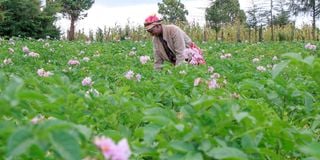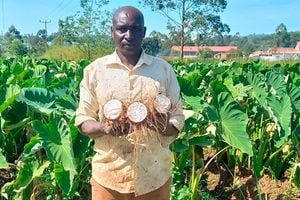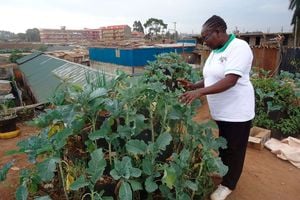
Evelyne Koech tends to her potato crop in her farm in Blue Gam village, Kuresoi South in Nakuru County.
Aeroponics, a technology that involves growing potatoes without soil, has been introduced in Njoro, Nakuru County. It is expected to provide seed multipliers clean planting materials.
The seed multiplication unit, launched under the World Food Programme’s Farm to Market Alliance project, is being implemented by the Cereal Growers Association.
It is expected to benefit seed producers in Nakuru, Nyandarua, Narok, Elgeyo Marakwet, Meru, Bungoma and other potato-growing regions.
Lily Chepkwony, a farmer in Keringet, Nakuru County, has been growing potatoes for more than 10 years.
She understands the challenges that come with potato farming, particularly the scarcity of seeds. This raises the cost of production.
“I have been sourcing seeds from as far as Meru. For one truck of seeds from Meru County to Kuresoi South, I spend Sh6,000. I bring about 10 lorryfuls of seeds in one season,” she said.
Half of Chepkwony’s 12-acre piece of land is under potatoes. She hopes to increase the acreage and begin multiplying seeds soon.
“Now that there is a multiplication centre nearby, my production costs could go down by at least 30 per cent every season, largely due to low transport expenses,” she told Seeds of Gold.
Chepkwony said the seed unit would also help curb the shortage of certified seeds.
“Access to certified seed creates a ripple effect on the potato value chain. It allows potato farmers to increase harvests. This leads to competitive pricing of their produce, resulting in higher incomes,” she said.
For consumers, it means an endless supply of potatoes. It also ensures their food and nutrition security remains intact.
The unit is designed to supply high-quality seeds free from diseases.
Productivity of potatoes is seven to 10 tonnes per hectare, against the potential of 30 to 40 tonnes, according to the 2021-25 National Potato Strategy report.
Due to the shortage and high cost of certified seeds, more than 80 per cent of farmers recycle potatoes from previous harvests.
Experts have noted a significant drop in harvests, quality and profits in recent years.
Potato farmers also have to grapple with poor agronomic practices, high post-harvest losses, pests and diseases, exploitation by middlemen and unstructured markets.
Antony Kibe, a professor in agronomy at Egerton University, said: “Kenya can only produce about three per cent of certified seeds, leaving a 97 per cent gap, which is filled by recycling.”
This continues to threaten yields, leaving the more than Sh50 billion industry that employs at least 3.5 million Kenyans on its knees.
Cyrus Rororio, a farmer in Elgeyo Marakwet County, agrees that getting good seeds is a challenge. He has been growing potatoes for eight years. Last year, Kibe focused on ware potatoes, but he has set aside three acres for seed production in 2024.
“Even when seed is available, it’s often not of high quality. We expect the multiplicant in Njoro to improve the situation for farmers. It means we will get seeds that can be multiplied about three times before being replaced,” Prof Kibe said.
According to the 2021-25 National Potato Strategy, per capita potato consumption in Kenya is 25 kilos. The report projected that by 2022, a Kenyan would have consumed approximately 41 kilos a year, with a total consumption of 2.3 million tonnes.
The urban potato demand is growing at seven per cent every year. This is also because of the increased population and the changing eating behaviour.
Michael Njagi, the Productivity and Climate Resilience lead at the WFP, said potatoes are becoming increasingly important, being the second most consumed food in Kenya.
“The potato is becoming more of a food security crop, so we need to address the challenges facing the value chain,” he said.
“There is need to have mechanisms that will increase the availability of quality potato seeds.”









